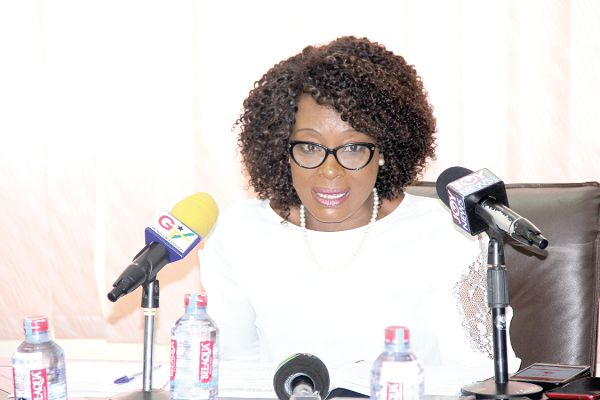
A-G urges Supreme Court to dismiss referendum suit
The Attorney-General (A-G) has prayed the Supreme Court to dismiss a suit challenging the planned referendum for the creation of six new regions.
In its statement of defence signed by a Deputy A-G, Mr Godfred Yeboah Dame, the A-G argued that the plaintiffs had failed to identify any constitutional infraction in the process leading to the referendum and the referendum itself.
Plaintiffs case
On September 12, 2018, three persons — Mayor Agbleze, Destiny Awlimey and Jean Claude Koku Amenyaoglo — filed a case at the Supreme Court challenging the government’s decision to limit a referendum for the creation of six new regions to only the affected areas.
The plaintiffs invoked the original jurisdiction of the Supreme Court to interpret portions of the 1992 Constitution with respect to holding referenda in the country.
Attached to the suit as defendants are the A-G and the Electoral Commission (EC).
Advertisement
The suit was the second legal action challenging the referendum process. In September, a non-governmental organisation, Strategic Thinkers Network -Africa (Stratnet) also went to court challenging the limitation of the referendum in only the affected areas.
According to the plaintiffs, the decision to limit the referendum to only the six areas where the proposed regions would be created violated Articles 5(1)(a) and (b), 5(4) and 42 of the 1992 Constitution.
They argued that limiting the referendum to only the affected areas would not reflect the true will of the people since the need for the regions arose from demands from the people in the affected areas.
In the plaintiffs’ view, the framers of the Constitution intended for every member in the existing region to decide on the need for a new region and, therefore, it would be unreasonable to limit the voter registration exercise to only the parts recommended to be created as new regions.
The plaintiffs further argued that Article 42 of the 1992 Constitution stipulates that all persons eligible to vote in a referendum or election in a region must vote.
“No cause of action”
But the A-G, in its response, argued that the suit had failed to raise any plausible case that required constitutional interpretation or any case of constitutional violation.
According to the A-G, the plaintiffs’ case that the limitation of the referendum to the affected areas was unconstitutional was wrong.
Article 5(4) of the 1992 Constitution, the A-G argued, gave the Commission of Enquiry the power to determine “the places where the referendum should be held”.
“Even though plaintiffs make an allegation of a violation of the Constitution by the defendants, a careful perusal of their writ will disclose that none of the reliefs sought by the plaintiffs actually suggests a violation of the Constitution by the defendants,’’ the A-G submitted.
“Failed to invoke court’s jurisdiction’’
The A-G was also of the view that the plaintiffs, by failing to raise any constitutional case, had failed to properly invoke the original jurisdiction of the court to interpret constitutional provisions.
It contended that the plaintiffs only went to court because they were dissatisfied with the referendum process.
“It will be respectfully observed that the practice whereby citizens invoke the original jurisdiction of this court simply because they are dissatisfied with the outcome of work done by a constitutional body under a constitutional power is becoming the order of the day. Same ought to be nipped in the bud as this court is getting inundated with all manner of frivolous constitutional suits,’’ the A-G avers.
Background
On August 15, 2017, the Council of State advised President Nana Addo Dankwa Akufo-Addo to appoint a Commission of Enquiry to look into the need to create six regions and to make recommendations on all the factors involved in the creation of the new regions.
The commission, which was established pursuant to Article 5 of the 1992 Constitution and Constitutional Instrument, C.I 105, commenced work on November 21, 2017.
On June 27, 2018, the Justice Brobbey Commission presented its report to President Akufo-Addo and recommended the creation of six new administrative regions namely Oti, Ahafo, Brong East, Western North, North East and Savanna.
The Commission of Enquiry recommended to the President that the referendum should be limited to the proposed new regions.
Consequently, the EC has set December 27, 2018 for the referendum.
Writer’s email: emma.hawkson@graphic.com.gh
